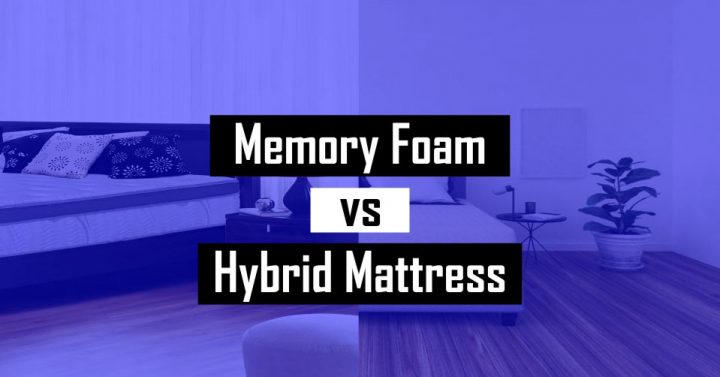
When shopping for a mattress, you’ll come across various types, each claiming to offer the best sleep experience. Two of the most popular options are memory foam and hybrid mattresses.
This article compares and contrasts Memory Foam vs Hybrid Mattresses to help you decide best.
Difference Between Memory Foam and Hybrid Mattress
Hybrid mattresses tend to be firmer than memory foam. Hybrids can also have soft layers, though. The firmness of your mattress will vary depending on your body type and weight.
A firm bed may feel softer if you have a higher body weight than someone with a lower body weight.
| Features | Memory Foam | Hybrid |
|---|---|---|
| Overall Feel | Close-fitting with superior pressure relief and motion isolation. | Conforming and responding in a balanced way. |
| Price Range | $800 to $2,500 | $1,200 to $2,000 |
| Ideal For | It is well-suited for side sleepers and people needing pressure relief from arthritis or joint pain. | Suitable for various sleep positions and preferences, making them a good choice for couples with different needs. |
| Advantages | Abundant Stress ReductionHugging Feeling Exceptional Motion Isolation | Exceptional Edge Support Bouncy and Responsive Feel Improved Control over the Temperature |
| Disadvantages | Overheating Tendency Prone to Off-gassing Reduction in Mobility | Heavier and Harder to Mov Higher Cost on Average Noisy |
What are Memory Foam Mattresses?
Memory foam mattresses are constructed primarily from viscoelastic foam, designed to respond to body heat and pressure. This results in a mattress that contours to your body, providing a plush and comfortable sleeping surface.
Pros and Cons of Memory Foam Mattresses
There has been a rise in the popularity of memory foam mattresses due to their ability to contour the body and provide both fantastic support and pain relief.
Memory foam is also durable and resistant to dust mites and allergens. Here are the detailed benefits and disadvantages of memory foam mattresses:
Pros:
- Pressure Relief: Memory foam excels at relieving pressure points, making it an excellent choice for individuals with joint or muscle pain.
- Motion Isolation: These mattresses absorb motion, ensuring minimal disturbance when your partner moves at night.
- Personalized Comfort: Memory foam molds to your body shape, providing personalized support and alignment for a comfortable sleep.
- Hypoallergenic: High-quality memory foam mattresses resist allergens like dust mites and mold, benefiting allergy sufferers.
- Durability: Well-maintained memory foam mattresses can last several years, offering good value for your investment.
Cons:
- Heat Retention: Some memory foam mattresses can trap heat, potentially making you feel warm during sleep. However, newer designs often include cooling technologies to address this issue.
Who Should Use a Memory Foam Mattresses?
Memory foam beds are made from materials that are good for your health. They are hypoallergenic and resistant to dust mites, which makes them great for people with breathing problems or allergies. Memory foam mattresses are ideal for:
- Side sleepers who are seeking pressure relief.
- Individuals with joint or muscle pain.
- Light sleepers who want minimal motion transfer.
What are Hybrid Mattresses?
Hybrid mattresses have both supportive innerspring coils and comfortable memory foam layers.
Pros and Cons of Hybrid Mattresses
With memory foam/ latex and pocket coils, you get the best of both worlds in comfort and support.
Be careful of the foams used because some blends still give off gas or sag because they are made of lower-quality materials. Here are the detailed benefits and disadvantages of Hybrid mattresses:
Pros:
- Support and Comfort: Hybrids support innerspring coils along with the comfort and contouring of memory foam layers.
- Breathability: Innerspring coils allow for better air circulation, keeping you cool during the night.
- Edge Support: Hybrid mattresses often have reinforced edges, making getting in and out of bed easier and providing a larger sleep surface.
- Versatility: Hybrids are suitable for many sleepers, accommodating different preferences and body types.
Cons:
- Price: Hybrid mattresses can be more expensive than memory foam or traditional innerspring mattresses.
- Motion Transfer: While hybrids offer decent motion isolation, they may not perform as well as memory foam mattresses.
Who Should Use a Hybrid Mattress?
Hybrid mattresses are suitable for:
- Sleepers who prefer more bounce and easier to move on.
- Cold sleepers who tend to sleep hot.
- Sleepers who prefer a balance of support and comfort.
- Individuals who are looking for improved breathability.
- Couples with varying sleep preferences.
Conclusion
There is no one-size-fits-all answer in the ongoing debate of Memory Foam vs Hybrid Mattress. Both options have their unique strengths and cater to different sleep preferences.
Consider your sleeping style, firmness preferences, and budget to make the right choice. Ultimately, a good night’s sleep depends on finding the mattress that meets your needs.
